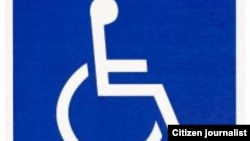WASHINGTON DC —
The National Association of Societies for the Care of the Handicapped (NASCOH) says 20 percent of people living with disabilities in Zimbabwe have no identity documents and risk being left out of important national processes such as the referendum and elections.
NASCOH disability technical expert, Fambaineni Magweva, told parliament’s Millennium Development Goals Thematic Committee, it is crucial for the government to ensure everyone in the country has proper documentation.
Mr. Magweva said his organization is working with the Zimbabwe Electoral Commission to provide voter education to people with disabilities, adding they are lobbying government to ensure polling stations will be accessible - come election time.
He said people with disabilities make 20 percent of the poor in Zimbabwe "and 95 percent of them are out of both formal and informal employment."
The most affected are women with literacy rates as low as five percent, said Magweva.
He said despite the enactment of the Disabled Persons Act way back in 1992, the majority of people living with disabilities continue to live in abject poverty as government has failed to provide resources to uplift their lives.
He said most programs supporting people with disabilities are sponsored by churches and non-governmental organizations.
Tsarai Mungoni, NASCOH research and advocacy officer, also said the Disabled Persons Act has done nothing to solve their problems.
NASCOH believes that most problems facing people with disabilities can be resolved if Zimbabwe ratifies the United Nations Convention on the Rights of Persons with Disabilities.
NASCOH, a coalition of 70 organizations, estimates that Zimbabwe has two million people living with disabilities. About 700,000 of them are eligible to vote.
Committee chairman, Chief Lucas Matshane, said some of the concerns raised in Tuesday’s hearing would be addressed in the new constitution though the groups complain that their views were largely ignored in the draft charter.
NASCOH disability technical expert, Fambaineni Magweva, told parliament’s Millennium Development Goals Thematic Committee, it is crucial for the government to ensure everyone in the country has proper documentation.
Mr. Magweva said his organization is working with the Zimbabwe Electoral Commission to provide voter education to people with disabilities, adding they are lobbying government to ensure polling stations will be accessible - come election time.
He said people with disabilities make 20 percent of the poor in Zimbabwe "and 95 percent of them are out of both formal and informal employment."
The most affected are women with literacy rates as low as five percent, said Magweva.
He said despite the enactment of the Disabled Persons Act way back in 1992, the majority of people living with disabilities continue to live in abject poverty as government has failed to provide resources to uplift their lives.
He said most programs supporting people with disabilities are sponsored by churches and non-governmental organizations.
Tsarai Mungoni, NASCOH research and advocacy officer, also said the Disabled Persons Act has done nothing to solve their problems.
NASCOH believes that most problems facing people with disabilities can be resolved if Zimbabwe ratifies the United Nations Convention on the Rights of Persons with Disabilities.
NASCOH, a coalition of 70 organizations, estimates that Zimbabwe has two million people living with disabilities. About 700,000 of them are eligible to vote.
Committee chairman, Chief Lucas Matshane, said some of the concerns raised in Tuesday’s hearing would be addressed in the new constitution though the groups complain that their views were largely ignored in the draft charter.








